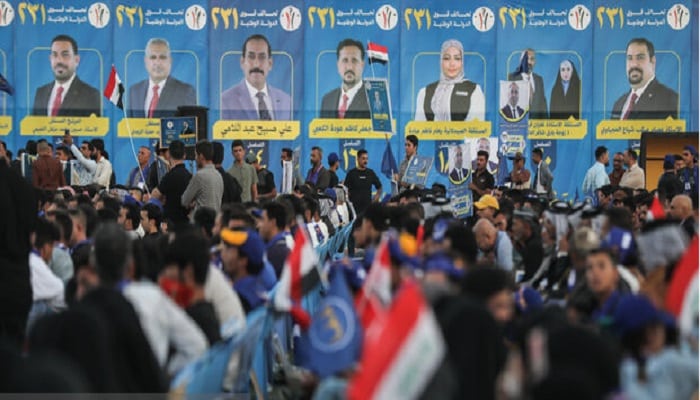PNN – The outcome of the Iraqi elections is very decisive; a government close to Iran could accelerate the US withdrawal, while a government inclined to Washington would limit the resistance’s influence.
The Iraqi parliamentary elections, scheduled to be held on November 10, are not only a domestic event to determine the 329 seats in the Council of Representatives, but also a complex arena for the clash of interests between regional and international powers. These elections, the sixth since the fall of the Baathist regime in 2003, are being held in a situation where Iraq is facing internal challenges such as declining participation of the new generation, corruption, and unproductive competition.
On the other hand, the new Iraq is affected by the geopolitical developments in the region. The situation of the axis of resistance after the Gaza war, the fall of the Assad regime in Syria, and the third Lebanon war has turned Iraq into one of the most important players in the axis of resistance against American and Zionist pressures. In this note, we will examine the impact of key rivalries between Iran and the United States, Iran and Saudi Arabia and the UAE, Iran and Turkey, and Israeli threats against the axis of resistance in Iraq.
Read more:
Israeli researcher: Iraqi elections will be decisive in future conflicts.
The 2025 Elections in Light of the Iran-US Competition
After the 2021 elections, which were marked by widespread protests and political crisis, Iraq is now welcoming elections with a proportional representation system in 18 constituencies, based on provinces. More than 7,768 candidates are competing in 31 coalitions and 38 parties, but turnout is expected to be lower than the 40 percent in 2021 and even as low as 20 percent.
The current Prime Minister, Mohammed Shia al-Sudani, has a high chance of remaining in power with the “Construction and Development” coalition and the support of the Shiite Coordination Framework, which includes groups close to Iran. It seems that the main competition in the upcoming elections will be Mayat Al-Sudani against Nouri Al-Maliki and Hadi Al-Amiri.
Muqtada al-Sadr has, as before, boycotted the elections and called on his supporters not to participate, which effectively benefits the Tansiqiyya. The elections are being held against the backdrop of a fragile oil economy, a water crisis, and security threats from ISIS. But the determining factor is the external competition that has turned Iraq into a “battlefield.” The competition between Iran and the United States is the main axis influencing the elections. Washington has begun a gradual withdrawal by 2026 with about 2,500 official troops in Iraq, but at the same time has increased pressure to disarm the Popular Mobilization Forces.
US Special Envoy Mark Sawaya Stresses Principle of “Independent Iraq Free of Malign Iranian Influence”! Washington Supports Al-Sudani to Form a Coalition without Groups Close to the Resistance, While New Sanctions Are Being Applied Against the Popular Mobilization Forces and Pressure to Restrict Banking Relations with Iran.
Iran, however, considers Iraq its “strategic depth” and does not intend to leave this natural ally alone in the face of external threats. Accordingly, Iran, in the role of a “benevolent brother,” is trying to reduce the differences between Shiite groups and move them towards coalition building with the aim of winning the elections. Tehran supports separate Shiite lists to maximize seats while also supporting the unification of these groups after the elections. The unique situation of the resistance makes Iraq a priority, but the internal divisions that have fueled the Sudanese-Maliki rivalry may create new opportunities for Iran’s rivals, especially the United States.
The Brotherhood-conservative Sunni axis seeks to create a balance against the resistance
The outcome of the Iraqi elections is very decisive. A government close to Iran could accelerate the US withdrawal, while a government inclined to Washington would limit the influence of the resistance! At the same time, efforts are being made to balance the Saudi and UAE economies with large investments (such as construction and energy projects) with the aim of creating a balance against Tehran. Riyadh has supported Al-Sudani to mediate with Iran, but in the elections it is supporting anti-Iranian Sunni and Kurdish coalitions. The UAE is also advancing economic competition with Iran by supporting Mohammed Al-Halbousi (Advance Current) and investing in the Kurdistan Region. These countries see Iraq as a bridge to the new Syria (after Assad) and see the elections as an opportunity to weaken the axis of resistance. Al-Sudani has gained popularity by balancing between Tehran and Riyadh, but US financial pressures (sanctions) are pushing him towards the West.
Turkey has increased its influence in Iraqi Kurdistan through military operations against the PKK and dams on the Tigris and Euphrates rivers. Ankara supports the Kurdistan Democratic Party and has taken “dangerous gambles” on water and energy issues in national elections. Competition with Iran in Kurdistan (Tehran’s support for the Patriotic Union of Kurdistan) has complicated the elections. The KDP may make deals with Baghdad for oil, but Ankara threatens further intervention. The competition places Kurds between independence and dependence, and affects post-election coalitions.
The shadow of Israel’s threat over Iraq
Following a phone call between the US and Iraqi defense ministers and the US Secretary of War’s threat to Iraqi sovereignty regarding the need for resistance groups to remain passive regarding future developments in the region, the possibility of Israeli aggression extending to Iraq as the resistance’s main base has increased. Israel sees increasing threats from Iraq (Kataib Hezbollah missiles and drones). Experts believe that in the current situation, limited attacks on the Iraqi resistance and the threat of a preemptive strike will affect the elections. If the threats of the US and the Zionist regime regarding the Iraqi resistance groups are implemented, the possibility of these groups intensifying their missile and drone attacks against the occupying regime in Jerusalem will increase significantly. If a weak government is formed, the Zionist regime may extend the scope of operations to Iraq, which will disrupt stability.

